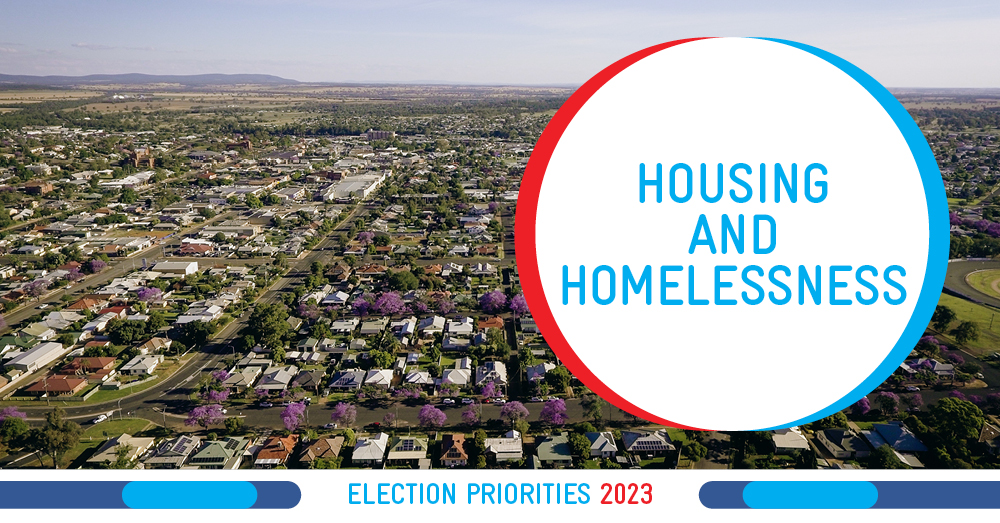
2023 Election Priorities - Housing and Homelessness
Across the State, there is no doubt that the housing crisis is at the forefront of community concerns in the lead up to the State Election on 25 March.
Access to secure, affordable housing is a basic human need and key to a healthy, prosperous and equitable society.
Conversely, a lack of affordable housing compounds intergenerational inequality and harms social cohesion. It further functions as a hand brake on economic recovery and productivity, impacting communities and businesses as workers are priced out of local housing markets.
Cost of living pressures and escalating interest rates have created financial uncertainty for home owners. Meanwhile, the rise in demand for rental property, as well as the rise in rental costs, is well documented across regional and metro markets.
The NSW Government must do its part to ensure everyone – and especially the most vulnerable members of the community – have access to a safe and secure home. We need to see clever solutions for this complex issue, and recognition that genuine State and federal investment in social and affordable housing must be a major part of the solution.
For these reasons, and supported by multiple Annual Conference resolutions over many years, LGNSW is calling for all candidates and parties at the 2023 State Election to commit to:
- Build 5,000 additional units of social housing each year for the next 10 years to contribute to addressing the homelessness and housing affordability crisis right across NSW.
- Minimum targets of 5-10% social and affordable housing across NSW and 25 per cent for government-owned land.
- Establish a ministry solely dedicated to addressing homelessness and the housing crisis.
Ask #1 - Build 5,000 additional units of social housing each year for the next 10 years to contribute to addressing the homelessness and housing affordability crisis right across NSW.
In NSW there are almost 50,000 people who are waiting for social housing, with wait times of up to 10 years. Combining social and affordable housing, the shortfall in NSW was estimated at more than 200,000 dwellings even before the pandemic.
Population movements sharpened by the COVID pandemic, and the loss of housing from bushfire and floods, have resulted in plunging vacancy rates in many regional areas with severe housing pressures and extremely limited social housing availability. Since the bushfires and floods there are significantly more people, including vulnerable older people and families, who are living in inadequate accommodation.
The inability of lower paid workers to find appropriate, affordable housing can limit the capacity of industry to grow, and adversely affect local economies. A NSW Government commitment to fund more social housing would stimulate the NSW economy, result in jobs growth and deliver enormous social and economic dividends.
Ask #2 - Minimum targets of 5-10% social and affordable housing across NSW and 25 per cent for government-owned land.
Safe and secure housing is fundamental to people’s ability to contribute fully to society and the economy.
A lack of affordable housing not only affects the quality of life of individual families – who may be sacrificing basic necessities to pay for their housing or facing increased stress due to living in severely overcrowded housing due to lack of supply – but it also has a serious impact on employment growth and economic development.
The displacement of long-term residents due to a lack of affordable housing also reduces social cohesion, engagement with community activities such as volunteering, and extended family support. Social and affordable housing is, therefore, an important form of community infrastructure that supports community wellbeing and social and economic sustainability, including a diverse labour market and economy, and strong and inclusive communities.
LGNSW recommends that the proportion of affordable or social housing on government land under the proposed Transport Asset Holding Entity Affordable Housing Pilot be lifted to 25% (not 20% as currently proposed) and that this housing be provided in perpetuity rather than the proposed 15 years.
Ask #3 - Establish a ministry solely dedicated to addressing homelessness and the housing crisis.
With growing cost of living pressure placing financial burdens on homeowners and renters alike, the nation is facing a growing crisis in homelessness. The scale and urgency of the housing and homelessness crisis makes clear that a Minister must be dedicated to this issue, to ensure it receives the necessary attention and that appropriate solutions and measures are identified, championed and implemented.
A Federal Minister for Homelessness has been appointed in recognition of the growing housing crisis – it is appropriate that we have a State Minister specifically for housing and homelessness to ensure NSW is not left behind.
The three housing and homelessness commitments are detailed in LGNSW’s 2023 Election Priorities document.
Councils are also invited to use the resources contained in the Local Government Pre-Election Advocacy Toolkit.
BACK TO NEWS